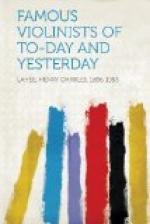When he reached home after an absence of six years, he was the possessor of a considerable fortune, part of which he lost by injudicious investments. Some friends induced him to join them in the establishment of a casino in a fashionable locality in Paris. It was called the Casino Paganini, and was intended to be a gambling-house. The authorities, however, refused to grant a license, and it was found impossible to support it by concerts only. After some vicissitudes a law-suit was established against Paganini, who was condemned to pay fifty thousand francs, and to be imprisoned until the amount was paid, but this decision was not reached until Paganini was in a dying condition, and he went, by the advice of his physicians, to Marseilles, where he remained but a short time. Finding that his health did not improve, he decided to pass the winter at Nice, but the progress of his ailment was not checked, and on May 27, 1840, he expired.
By his will, made three years previously, he left an immense fortune and the title of baron, which had been conferred on him in Germany, to his son Achille,—the fruit of a liaison with the singer Antonia Bianchi of Como,—whose birth had been legitimised by deeds of law. His fortune amounted to about four hundred thousand dollars, besides which he had a valuable collection of musical instruments. His large Guarnieri violin he bequeathed to the town of Genoa, that no artist might possess it after him.
During his last illness Paganini, not realising that death was so near, devoted himself to music and to arranging for another concert tour. During his lifetime he had never paid much attention to religion and there were some doubts as to his belief. Although he expressed his adherence to the Roman Church, yet he dallied with its formalities, and when the priest visited him three days before his death to administer the final consolations of religion, the dying man put him off on the ground that he was not yet ready, and would send for him when the time came. Death prevented this, and burial in consecrated ground was therefore denied him. An appeal was made to the spiritual tribunal and in the meantime the body was embalmed and kept in a hall in the palace of the Conte di Cessole, whose guest he was during his last illness.
People now began to come from all parts of Italy to pay honour to the dead artist, and this so angered the bishop and priests that an order was obtained for the removal of the body. Under military escort the remains of the great violinist were taken to Villafranca and placed in a small room, which was then sealed up. And now Paganini became a terror to the ignorant peasants and fishermen, who crossed themselves as they hurried past the spot where the excommunicated remains lay. It was said that in the dead of night the spectre of Paganini appeared and played the violin outside his resting-place.




